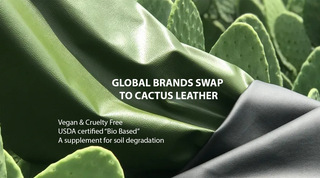- Whilst we usually applaud all things vegan, an "alternative" we don't choose to get behind is plastic-derived "vegan leather" a.k.a. PLEATHER
Enjoy 10% off sustainable Christmas shopping!
Use "ECOXMAS" at checkout, for our entire range on Ecocious.com.au
The truth about PLEATHER (Vegan Leather)
Most vegan leather goods are made from polyvinyl chloride "PVC" or polyurethane "PU", both well known to contain toxic chemicals, phthalates, and traces of bisphenol A - compound known to cause reproductive problems.
Technically vegan leather (even if it is plastic-based) is still more environmentally friendly than leather made from animals, for several reasons.
- Many resources are needed to raise animals for leather - huge amounts of land, water, and feed; livestock (especially cows - the primary source of animal leather)
- Leather production emits a significant amounts of methane (greenhouse gas) into the atmosphere.
- Faeces, waste & chemical pollution is released as a by product into the air, soil and waterways putting local communities in danger.
Not to mention, animal-based leather is not a "natural" material, although many "leather lovers" may claim it to be, which you can thank to the tanning process.
[trigger warning:] After the animals are killed, their skin is treated with "tanning" agents including formaldehyde and chromium, both of which the EPA classified as human carcinogens. Due to the extensive use of chemicals required to tan leather, the material is saturated with too many chemicals to ever biodegrade.
A better Solution exists; Cactus leather
Discover our range of Cactus Leather accessories, from Texcoco Collective - here. Support our female founded, local Australian designer for social & environmental change!
To be specific & transparent, as always, Nopal a.k.a "Prickly Pear" cacti.
Since 2019, Cactus Leather has emerged on a global scale and is often referred to as the most sustainable option out of vegan leather alternative. This is attributed to many factors; one we are most excited about - the plants ability to remove released carbon from the atmosphere!
Cacti fields are a huge carbon sink during the growing process. Making the growing of this material carbon positive!

Another amazing fact about harvesting Cacti, they require little to no water to thrive. Cacti are fostered with rainwater only and organically grown = no herbicides or pesticides are used in the process.
Additionally, when the cactus is fully grown (this takes 6-8 weeks at most) the most mature leaves are removed from the plant, leaving the root system in the ground, therefore not disturbing the soil which would otherwise release carbon if pulled out.
Cactus Leather BENEFITS:
- Breathable, flexible, soft material.
- Durable material
- Non-toxic chemicals used in manufacture/production.
- Environmentally friendly - Cactus naturally regenerates soil
- Vegan & Cruelty free
- Partially biodegradable (65% bio-based currently evolving to 90%)
- CARBON POSITIVE - Cacti plants sequester carbon from the atmosphere.

Why the world (& leading global brands) are getting so excited by Cactus Leather
Whether we like to acknowledge it - or not, we have all become more awakened to the impact our industries are placing on our natural environment. We are all noticing, first hand environmental changes, natural disasters, climate, weather and natural resources rapidly changing globally.
The conversations about conservation is louder than ever. Leaders are finally acknowledging the necessity to take care of emissions and plastics however conversations about soil, food waste, industrial & mining, agriculture & many more have not been clearly communicated.
One of the most crucial conversations for “global warming” lies right under our feet, our soil.

Soil Degradation is the decline in soil condition caused by improper use and poor management. It is a highly serious environmental problem, often overlooked and yet research directly links land erosion to the frequency of natural disasters and increasing the earths temperate, globally.
Causes of Soil Degradation:
- Deforestation
- Agriculture 1 - Overgrazing
- Agriculture 2 - Waste
- Agrochemicals - Chemicals/Pesticides/ Fertilisers = imbalance of microorganisms in soil = growth of harmful bacteria which is usually treated with (you guessed it) more chemicals!
- Industrial construction
- Mining - releases a myriad of toxic chemicals e.g. mercury into the soil, poisoning it and rendering it unproductive for any other purpose.
- Improper cultivation - deep plowing, reduction of plant cover,
(read more about soil degradation: here)
How the Cactus plant is beneficial to our soil.
- Nopal plantations can be used as water and carbon reserves on arid and semi-arid regions where climate is erratic.
- It can be used for the restoration of degraded land - it regenerates the soil.
- Cactus is a natural carbon sink, it has a great CO2 sequestering capacity.
- Less water intensive - It only takes 200 litres to grow one kilogram of cactus, compared to 1000 litres (on average) to grow the same kilogram from other crops.
- Cactus is tough and resilient, can adapt to extreme conditions & survive in areas where nothing else will grow.
- Cacti can thrive in severely degraded soils, which are inadequate for other crops.
Australian Designers using Cactus leather
This isn’t the first time we‘ve started a conversation about Cactus leather, re-visit our Cactus Q&A with Australian Designer, Monique Montfroy, Founder of Texcoco Collective: here
This cruelty-free alternative became globally popular by DESSERTO, gaining the approval of several major fashion designers who are proudly using cactus leather to make everything from bags, shoes, accessories.
Accessories and fashion aside, cactus leather has quickly made its way into being a sustainable vegan leather alternative for interiors & furniture.
Mercedez-Benz & Tesla have recently promoted their incorporation of this natural, eco-friendly material for the interiors of their electric cars.
Global Brands already using Cactus leather
- BMW
- Givenchy
- Fossil
- Karl Lagerfeld
- Mercedez-Benz
- Adidas
Sustainability Progress, not perfection.
We would love to praise Cactus leather for being a completely circular and sustainable product, but there is still room for improvement when considering the end of life stage with this material.
Although a USDA certified Biobased product, at this stage the leading brand DESSERTO, have acknowledged the percentage of the product that is biodegradable is sitting at 65% Biobased certified - soon to be 90%, awaiting updated certification.
Once this change is successful, the product will be considered sustainable/ circular as it has ability to break down at end of life.

(DESSERTO, https://desserto.com.mx/certified-biobased)
The good news is, you can make sure your own cactus leather goods are circular & sustainable by:
a) Understanding how to care for (clean & store) product
b) Purchasing via a store with a re-selling affiliate like, www.ecocious.com.au has partnered with AirRobe for circular shopping - upon purchase sign up for a re-selling account with product details auto linked so you are able to easily re-sell later, if you choose to.
c) If product is broken/ faulty choose to repair instead of sending product to landfill.
d) Always aim to gift, re-sell, donate rather then sending to landfill.
Enjoy 10% off sustainable Christmas shopping!
Use "ECOXMAS" at checkout, for our entire range on Ecocious.com.au


